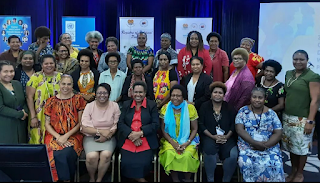By Lorraine Wotomu
The Diagnostic Forum on Women’s Participation in the 2022 National General Election was recently held in Port Moresby. A total of thirty-one (31) women candidates and seven (7) Political Party Executives from over all the country came together to share their experiences and challenges and produce a statement to empower women
The statement recommending a range of actions that should be taken by the Government and other partners to ensure elections outcomes in the 2027 national general elections are fair, inclusive and follow the law
During the opening ceremony, Acting Registrar of Political Parties, Mr. Emmanuel Pok said: “The Integrity of Political Parties and Candidates Commission (IPPCC) and Registry of Political Parties is strongly committed to supporting the development of a political culture that is accountable to, and inclusive of the people of Papua New Guinea”.
“We do this by working with political parties, to strengthen their ability to operate more effectively as platforms through which Papua New Guineans can participate in elections and in political life, both as political party members and as candidates. “To be more effective, political parties need to ensure that they are inclusive of the diverse range of Papua New Guineans including women of PNG. We know from the data however, that this has not been the case for most political parties over the many years”, said Mr. Pok
A total of 159 female candidates contested the 2022 National Election with 64 women endorsed by 14 political parties. There have been only nine (9) women elected to the National Parliament since Independence, including the most recent election (2022) with two (2) women successfully elected
RUFINA Peter-Central Governor and –Peoples National Congress Party (PNC)
KESSY Sawang- Rai Coast Open MP- People’s First Party (PFP)
Twenty female candidates polled in the top five (5) candidates in counting their respective electorates. This includes the two women declared winners:
The two women elected to the National Parliament make up less than 2 percent of the 11th National Parliament’s seat.
“It is well-known that candidates have a better chance of being elected if they are endorsed by a political party”, said Mr. Pok
Mr. Pok also added that, “IPPCC has been pushing for incentives for political parties to endorse women candidates, this is through the reviewing of the Organic Law on the Integrity of Political Parties and Candidates (OLIPPAC). Currently the OLIPPC Act states that, if a party endorses a women, they can recover 10% of the Primary votes cast in the electorate in that election. In the review we- (IPPCC and Registry) proposed that amount to be doubled”,
The IPPCC and Registry have been working closely with the United Nations Development Programme (UNDP) and United Nations Women (UN Women) over the years to support and promote the political participation of women in the country through political parties, this is supported with the Mentoring of Women Candidate program, which engages with more than 50 women across the country, to train and connect them with interested political parties”, Pok said.
The Women’s Election Diagnostics were produced in 2007, 2012 and 2017.From 2017 onwards, a number of these proposed actions were delivered by the IPPCC, UNDP, UN Women and ANU; most notably, networking, mentoring and leadership capacity building , with a number of women participating who went on to nominate as female candidates in the 2022 National General Elections. As a direct result of the IPPCC mentoring programme which included political parties in their activities, there has been an increased in the number of female candidates endorsed by political parties in 2022 compared to 2017 NGE; and were able to improve their branding and targeted messages. There were improvements in the election preparation by female candidates and those endorsed by political parties did far better than women who contested as Independent candidates.
The Forum is utilized to establish early collaboration for mentoring of women candidates for 2027 National General Election by Political Parties. The forum ran for three (3) days where women met together alone, to discuss their issues and identify their priorities. Then on the 2nd day the women candidates were brought together with election stakeholders to discuss specific issues women identified and plotted a way forward. On the third day, a joint discussion for mentoring between political party executives and women leaders as an early preparation for the 2027 National General Elections
The Key outcomes and findings are to inform Political Parties on ways to better support women candidates over the electoral cycle from 2022 to 2027.
This Forum was part of the Women Make the Change Project funded by the governments of Australian and New Zealand and is jointly implemented by the IPPCC and Registry and UNDP.

